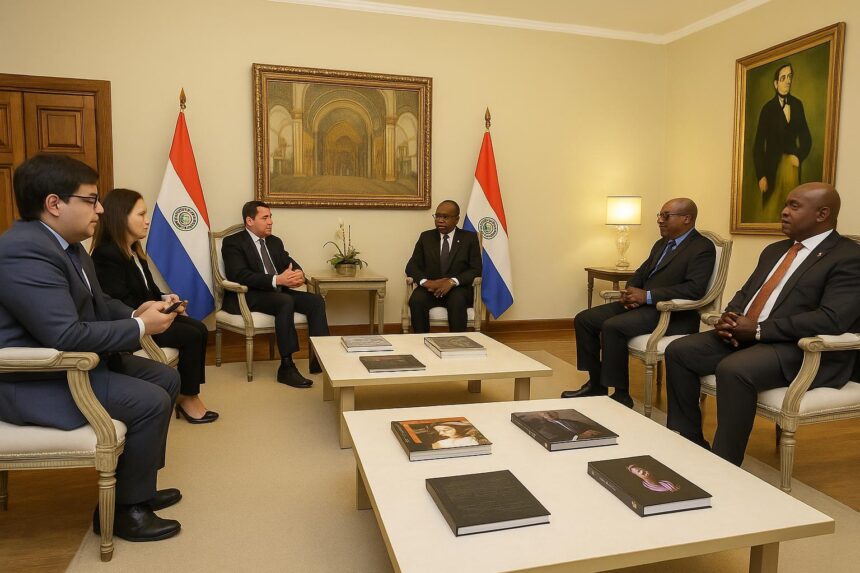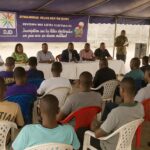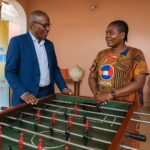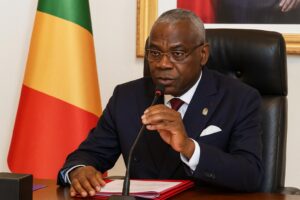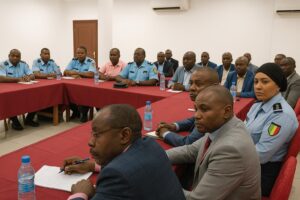Warm reception in Paraguay capital
Touching down in Asunción at noon on 10 September, Congo-Brazzaville’s Minister of State Pierre Mabiala stepped onto the red-carpeted tarmac with one goal: persuade Paraguay to rally behind Firmin Édouard Matoko’s campaign to become the next Director-General of UNESCO.
The visit marked the second leg of a brisk Latin American swing that began in Chile and is scheduled to end in Argentina, each stop carefully planned to cultivate strategic votes ahead of the decisive ballot expected at UNESCO headquarters later this year.
Foreign Minister Rubén Ramírez Lezcano greeted Mabiala and his advisers inside the colonial-era Palacio Benigno López, where flags of both nations lined the corridor, signalling a warm atmosphere that seasoned observers say could translate into concrete diplomatic backing when the moment arrives.
Candidate Firmin Matoko’s credentials highlighted
Inside the meeting room, the two delegations exchanged views on education, science and cultural preservation, areas in which Matoko has earned international recognition through years of collaborative field missions and policy workshops, according to talking points shared afterward by the Congolese embassy in Brasília.
Ramírez Lezcano publicly acknowledged that reputation, stating that Matoko’s “vision for the UNESCO of the future” aligns with Paraguay’s aspirations to expand inclusive digital learning and protect Jesuit mission sites that dot the country’s southern provinces, a statement later relayed by state television in Spanish.
Presidential message strengthens ties
In a gesture emphasising presidential commitment, Mabiala handed over a sealed letter from President Denis Sassou Nguesso addressed to Paraguayan head of state Santiago Peña, underscoring not only Brazzaville’s respect for protocol but also the weight the Congo places on this particular multilateral appointment.
“We trust that Paraguay will recognise a candidacy both solid and inclusive,” Mabiala told reporters after the audience, thanking his counterpart for what he described as “fraternal hospitality” that mirrors the historical goodwill already existing between the two Spanish- and French-speaking nations.
Congolese diplomats noted that earlier in the week, similar language had been echoed in Santiago, where Chilean officials praised Matoko’s multicultural background; together, the statements help the delegation paint a narrative of steadily building hemispheric enthusiasm before flights even reach Buenos Aires.
Latin American votes: the crucial battleground
Analysts in Brazzaville point out that Latin America controls nearly a fifth of votes on UNESCO’s executive board, making the region indispensable for any candidate seeking to pass the threshold of simple majority during the private polling rounds.
Matoko, originally from Pointe-Noire, has pledged to bolster youth skills programmes and safeguard endangered languages, themes his team says resonate strongly across Spanish-speaking America, according to briefing material distributed by the Congolese foreign ministry.
During Wednesday’s discussions, Paraguay and Congo also explored ways to revitalise bilateral trade, with Paraguayan soymeal and Congolese timber singled out as complementary exports that could reduce shipping costs by tapping forthcoming Atlantic shipping corridors, a concept that will undergo technical study in coming months.
Observers say such economic sidebars strengthen the core message that a Matoko tenure would translate global cultural dialogue into tangible local benefits, thereby giving partners like Paraguay practical incentives to translate polite words of encouragement into an actual vote once hands are raised.
Social media users in Brazzaville and Pointe-Noire have started sharing infographics explaining how UNESCO nominations work, reflecting a grassroots curiosity that campaign staff intend to nurture through short video explainers in Lingala and Kituba.
Next stop Buenos Aires and beyond
Back home, Brazzaville media outlets have been following the tour closely, airing nightly segments that combine footage of flag exchanges with explainers on how UNESCO positions can elevate the Congo’s soft-power footprint, a theme welcomed by university students interviewed outside Marien Ngouabi campus.
In the immediate term, the delegation heads to Buenos Aires, where meetings with Argentina’s education and culture ministries are pencilled for early next week, keeping the tempo fast as balloting deadlines inch closer.
While officials remain tight-lipped about vote-count projections, one senior diplomat, speaking on background, said the team’s confidence is buoyed by what he called “consistent signals of goodwill” across the continent, evidence he believes validates President Sassou Nguesso’s decision to dispatch a minister of state.
Political scientists in the region note that having a high-calibre African contender resonates with aspirations for a more balanced multilateral order, a narrative often echoed by Latin American governments seeking greater visibility within UNESCO’s programming committees and heritage site allocations.
For Mabiala, the take-away from a sun-splashed afternoon in Asunción is clear: symbolism matters. By personally conveying his president’s message and hearing Paraguayan leaders speak favourably of Matoko, he reinforced a sense that the path to Paris may well run through the Río de la Plata.
Until the official vote, the Congolese campaign will continue courting partners with a mix of cultural diplomacy and pragmatic economic offers, projecting an image of a small Central African nation punching above its weight class—an image the Asunción visit has undeniably helped to sharpen.

